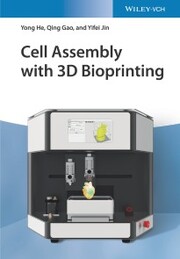-
Zusatztext
-
<p><b>Provides an up-to-date outline of cell assembly methods and applications of 3D bioprinting</b></p><p><i>Cell Assembly with 3D Bioprinting</i> provides an accesible overview of the layer-by-layer manufacturing of living structures using biomaterials. Focusing on technical implemention in medical and bioengineering applications, this practical guide summarize each key aspect of the 3D bioprinting process. Contributions from a team of leading researchers describe bioink preparation, printing method selection, experimental protocols, integration with specific applications, and more.</p><p>Detailed, highly illustrated chapters cover different bioprinting approaches and their applications, including coaxial bioprinting, digital light projection, direct ink writing, liquid support bath-assisted 3D printing, and microgel-, microfiber-, and microfluidics-based biofabrication. The book includes practical examples of 3D bioprinting, a protocol for typical 3D bioprinting, and relevant experimental data drawn from recent research.<br /><br />* Highlights the interdisciplinary nature of 3D bioprinting and its applications in biology, medicine, and pharmaceutical science<br />* Summarizes a variety of commonly used 3D bioprinting methods<br />* Describes the design and preparation of various types of bioinks<br />* Discusses applications of 3D bioprinting such as organ development, toxicological research, clinical transplantation, and tissue repair</p><p>Covering a wide range of topics,<i>Cell Assembly with 3D Bioprinting</i> is essential reading for advanced students, academic researchers, and industry professionals in fields including biomedicine, tissue engineering, bioengineering, drug development, pharmacology, bioglogical screening, and mechanical engineering.</p>
-
-
Autorenportrait
- Yong He obtained his PhD degree in mechanical engineering at the ZheJiang University in 2008. He is currently a professor at College of Mechanical Engineering, ZheJiang University, China. He is also the deputy director of Key Lab of 3D Printing Process and Equipment of ZheJiang Province. His research is focused on the biofabrication with 3D printing especially on the building organs on chips. He has published more than 100 international journal papers and authorized over 30 patents. He has developed many special 3D printers for the fabrication of microfluidic devices, such as 3D sugar printer and 3D softmatter printer.<br><br> Qing Gao obtained his BSc in mechanical design, manufacturing and automation at Hefei University of Technology in 2012. In 2017 he obtained his PhD degree in mechanical manufacturing and automation at the ZheJiang University and continue working in the university as a postdoc. He engages in research on biomanufacturing, biological 3D printing, organ chips, etc. As a core member, he has developed a portable biological 3D printer and high-performance GelMA bio-ink and is committed to building a "material + equipment + service" integrated intelligent manufacturing product system.<br><br> Yifei Jin received his Ph.D. in mechanical engineering from the University of Florida in 2018, He joined the Department of Mechanical Engineering at the University of Nevada, ¿Reno as assistant professor in July 2019. His primary research interests mainly involve 3D bioprinting of living tissue constructs, 3D printing of hydrophobic functional materials, yield-stress fluids for 3D printing applications, stimuli-responsive materials for 4D printing applications, and fabrication of multi-layered capsules. His research emphasizes the coupling of materials and fabrication approaches to develop novel 3D printing techniques and understand the underlying physics during printing.<br>
Detailansicht
Cell Assembly with 3D Bioprinting
eBook
ISBN/EAN: 9783527828586
Umbreit-Nr.: 3086834
Sprache:
Englisch
Umfang: 368 S., 136.83 MB
Format in cm:
Einband:
Keine Angabe
Erschienen am 15.11.2021
Auflage: 1/2021
E-Book
Format: EPUB
DRM: Adobe DRM


